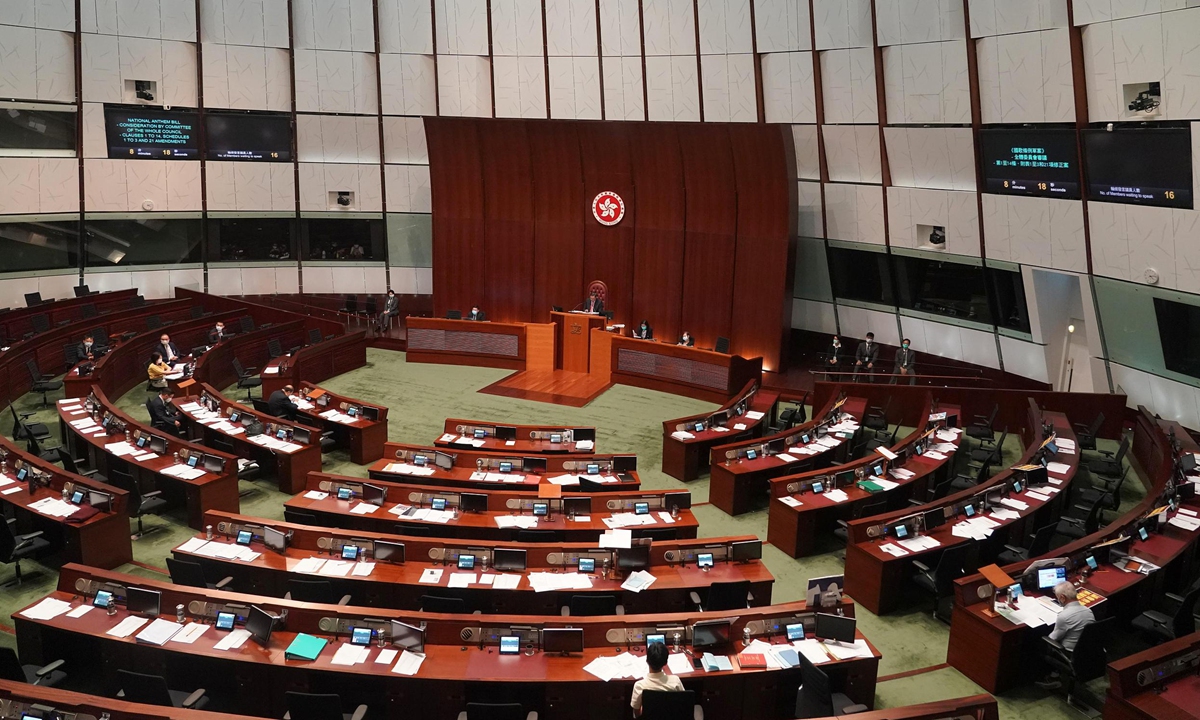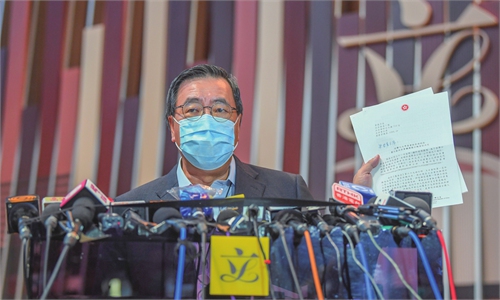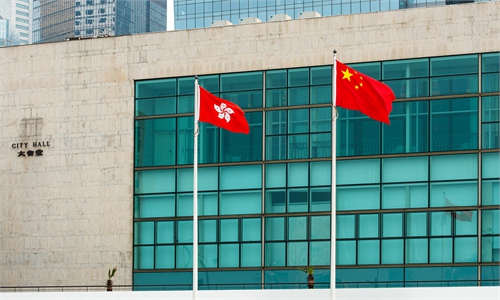HK officials can leave meetings with lawmakers who engage in disrespectful, unlawful deeds: guideline

HK LegCo File photo:VCG
Hong Kong media have revealed a new guideline that allows government officials of the Hong Kong Special Administrative Region (HKSAR) to leave meetings with district councilors when the latter engage in things that violate the "one country, two systems" principle and the national security law for Hong Kong.
Experts said that the move aims to prevent pan-democracy district councilors from engaging in political stunts, and some also urged the Legislative Council (LegCo) to bring similar measures to end some pan-democracy lawmakers' intention of paralyzing the LegCo at a crucial period.
The internal guideline was sent to government departments and the Home Affairs Department of the 18 districts by Matthew Cheung Kin-chung, Chief Secretary for Administration of the HKSAR, Hong Kong media reported on Friday.
It lists several circumstances where government officials can leave the meetings with district councilors: when councilors insult officials attending a meeting; and councilors intentionally display slogans or music that violate the "one country, two systems" principle and the national security law for Hong Kong. Officials can also be absent from meetings when the agenda exceeds the district councilors' authority.
The move was made against the backdrop of pan-democrats winning 388 seats against the 63 of the pro-establishment camp, and took control of 17 of HK's 18 district councils in the election in November 2019. Some of the councilors acted beyond their authority by "summoning" government officials for meetings and attempted to push for their political agenda.
For example, the Central and Western District Council put forward an incidental motion accusing the "lax supervision" of the Commissioner of Police in January. Chris Tang Ping-keung and the team left the meeting, according to Hong Kong media.
"District Councils are never the organ of power, and councilors' responsibility is to offer advice to the government to know residents' opinions. However, after radicals of the pan-democracy group entered the councils after November, they escalated their power by forcing government officials to attend meetings and vote, pushing political motions and staging political performances," Kennedy Wong Ying-ho, solicitor of the Supreme Court of Hong Kong, told the Global Times on Friday.
Some pan-democracy councilors are politicizing the district councils, which may hinder their services for the residents, Wong said.
After the passing of the national security law for Hong Kong, and with the new guideline, district councilors should shift their focus from political confrontations to topics centering on residents' livelihood, Wong noted.
The new guideline could also offer reference to the operations of the Hong Kong Legislative Council as the National People's Congress Standing Committee voted unanimously this week to extend the sixth Hong Kong Legislative Council (LegCo) lawmakers' terms of office by at least one year until the new LegCo begins, due to the coronavirus outbreak in Hong Kong, observers said.
They noted that the LegCo will have to deal with heavy tasks in next year's term, like mulling coronavirus prevention measures when high incidence seasons of fall and winter approach, reviewing the government's financial budget and discussing bills that affect the city's economic development and social welfare. All these agenda should not be messed up by some pan-democracy political farce.
Pan-democracy lawmakers should also stop making political stunts to attract public attention or seek personal political gain, Li Xiaobing, expert on Hong Kong, Macao and Taiwan affairs, from Nankai University in Tianjin, told the Global Times.
Pan-democracy lawmakers reportedly tried to paralyze the LegCo, leading to the suspension of proceedings several times. For example, due to the intentional delay of pan-democracy lawmakers, the election for chairman of the House Committee of the LegCo lasted more than six months and did not yield any result after 17 meetings, Hong Kong media reported.
Li and Wong think that the LegCo needs to improve its regulations in accordance with the new momentum, and lawmakers should also fulfill their responsibilities.
Hong Kong pro-establishment lawmaker Junius Ho Kwan-yiu told the Global Times that the guideline would also be regarded as a warning to pan-democrats. He called on the Hong Kong government to take tougher measures if pan-democracy district councilors do not stop making political farce.



